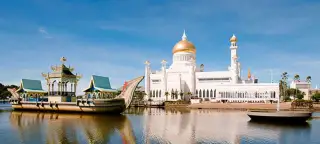Small Group Experiential Travel
Excellent
Attractive destination
4.7
Escape the beaten path
Visit the must-see highlights then discover little-known attractions most tourists never hear about.
All-inclusive comfort
Get more value with all-inclusive trips featuring top-rated restaurants and hotels.
Small Group Size
Our small group of 12-18 like-minded travellers - including
singles
, couples and more allows for greater personal attention, with a maximum group size of 16-18 people. Tour Leaders
Simply the best in the business, our leaders exude professionalism, knowledge, and enthusiasm.
READY TO GO?
Upcoming Departures
EXPLORE SOUTHEAST ASIA
3 Tours in Indonesia
Filters
14 Day Indonesia Tour
14 Days
Tour Code: ID6
Mar
1 Country
2-Moderate?
Cultural?
Borobudur: largest stupa-style Buddhist monument in the world ● Prambanan: most extensive Hindu temple site in Indonesia ● Bali - island paradise ● Lake Toba & Samosir island
$3,550/ppUSD
22 Day Indonesia & Timor Leste Tour
22 Days
Tour Code: JHIE
Apr
2 Countries
2-Moderate?
Cultural?
Orangutan sanctuary in Tanjung Puting National Park ● Ancient Borobudur temple
Majestic Bromo volcano sunrise ● Traditional Toraja villages and funeral rituals ● Snorkeling with manta rays at Makassar Reef ● Komodo dragons in their natural habitat.
$9,510/ppUSD
27 Day Malaysia & Indonesia Tour
27 Days
Tour Code: MA5
Mar
3 Countries
2-Moderate?
Cultural?
Bustling Kuala Lumpur - city tour ● Historic Malacca tour ● Kuching: City Tour & Sarawak Cultural Village ● Kinabatangan River nature cruise ● Sepilok Orang Utan Sanctuary ● Brunei Darussalam area tour ● Borobudur: largest stupa-style Buddhist monument in the world ● Prambanan: most extensive Hindu temple site in Indonesia ● Bali - island paradise ● Lake Toba & Samosir island
$7,320/ppUSD
Filter By
About Indonesia
Spread across 17,000 islands, the archipelago of Indonesia holds relics from ancient civilizations deep within lush tropical jungles and strewn across postcard perfect beaches. Floating in the Pacific and Indian Oceans, Indonesia tours give an in depth look at one of Southeast Asia's most vibrant countries. Early evidence of fossils and tools show that Indonesia has been inhabited since 1.5 million years ago by homo erectus or Java man. The descendants of today's population likely arrived about 25,000 - 45,000 years ago. Due to the abundance of fertile lands, Indonesia became a maritime trading centre with China and India in ancient times. Power and wealth continued to spread into the 7th century and hee Srivijaya naval kingdom began receiving influences of Hinduism and Buddhism. This was an extremely important part of the country's history, and Indonesia tours will highlight architectural masterpieces from this time frame. Borobudur, the largest stupa-style Buddhist monument in the world, was built during this kingdom's reign in the 8th century. A great work of art, the complex is built with a pyramidal base with five concentric square terraces, the trunk of a cone with three circular platforms and, at the top, a monumental stupa. Decorated with fine reliefs, there are also 72 openwork stupas, each containing a statue of the Buddha. Another great monument from this time is the Prambanan Hindu temple. Built around 850 AD, it is characterized by its tall and pointed architecture, which is typical of Hindu temple architecture. Religion has always played an important role within Indonesia, with many ancient sites across the country being dedicated Hindu or Buddhist temples. On the island of Bali, Brahma Arama Vihara is an important Buddhist shrine on an island that is dominated by mostly Hindu people. Bali's most important temples, Besakih and sacred Mount Agung, are to the Balinese what Mount Olympus was to the ancient Greeks. Further temples include the Tanah Lot, perched on large rocks in the sea which was built in the 16th century and is perhaps one of Bali's most recognizable landmarks. Charming towns dot the pristine landscape of Bali such as Penglipuran village, well known for its tidy row of traditional Balinese entrance gates. Fishing villages in the coastal region of Lovina spring to life at nighttime with the entire fleet seemingly in the water fishing with their lanterns on. While the east coast of Bali has elegant Balinese Hindu temples sprouting amid lush green rice terraces, the northern island Sumatra is volcanic in nature with many sulfurous hot springs and waterfalls found near the Lake Toba region. Through agriculture, many Indonesians have maintained a simple life. Near Lake Toba and Medan the five Karo Batak clans and 83 sub-clans inhabit a high, lush plateau of mountain slopes and rich volcanic valleys. Many complex cultures exist in the country such as the Batak who were formerly head-hunters and cannibals. Due to their isolation in the high mountains, they have retained many of the ancient proto-Malay cultural traditions. In Bali, an important cultural event is the Barong play which is a folklore dance that represents the eternal fighting between good and evil spirit. With over 17,000 islands, the possibilities on Indonesia tours are endless.
Our leaders exude professionalism, knowledge, and enthusiasm.
Tour Leaders for Indonesia Tours



